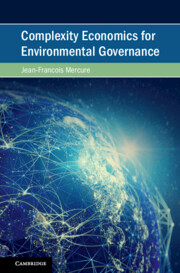
- Publisher:
- Cambridge University Press
- Online publication date:
- November 2022
- Print publication year:
- 2022
- Online ISBN:
- 9781108553650
Last updated 10th July 2024: Online ordering is currently unavailable due to technical issues. We apologise for any delays responding to customers while we resolve this. For further updates please visit our website https://www.cambridge.org/news-and-insights/technical-incident


In Complexity Economics for Environmental Governance, Jean-François Mercure reframes environmental policy and provides a rigorous methodology necessary to tackle the complexity of environmental policy and the transition to sustainability. The book offers a detailed account of the deficiencies of environmental economics and then develops a theory of innovation and macroeconomics based on complexity theory. It also develops a new foundation for evidence-based policy-making using a Risk-Opportunity Analysis applied to the sustainability transition. This multidisciplinary work was developed in partnership with prominent natural scientists and economists as well as active policy-makers with the aim to revolutionize thinking in the face of the full complexity of the sustainability transition, and to show how it can best be governed to minimize its distributional impacts. The book should be read by academics and policy-makers seeking new ways to think about environmental policy-making.
‘Jean-Francois Mercure is in the vanguard of experts seeing the economy in a new way: not as a predictable machine, but as an ever-changing ecosystem. His insights will be valuable to anyone who wants to bring about real-world change. This book is an essential guide to the new economics of climate change.'
Simon Sharpe - Deputy Director, Policy campaigns, COP26 Unit, UK Cabinet Office
‘This important book mobilises insights from complexity economics and socio-technical transitions theory to rethink the nature of our responses to persistent environmental problems. Acknowledging the need for system transformation, this back-to-basics book develops ways of understanding the relevant processes of change and provides policy suggestions for governing them. Combining new theories, new modelling techniques, and new empirical information this book develops foundational insights that will be essential for navigating sustainability transitions.'
Frank Geels - Professor of System Innovation, University of Manchester
The world is slowly waking up to the importance of modern economic thinking which recognises economies as complex, evolving systems combining innovation in technologies, finance and institutions. The insights arising are especially important for navigating large-scale transitions, such as the radical challenges associated with climate change. Few scholars have done more to raise awareness and to advance thinking about these issues than Jean-Francois Mercure. His impressive book, Complexity Economics for Environmental Governance, is the most rigorous and comprehensive guide to this exciting field and the essential insights arising, and deserves to become the definitive text for the field.
Michael D. Grubb - Professor of Energy and Climate Change, University College of London
 Loading metrics...
Loading metrics...
* Views captured on Cambridge Core between #date#. This data will be updated every 24 hours.
Usage data cannot currently be displayed.